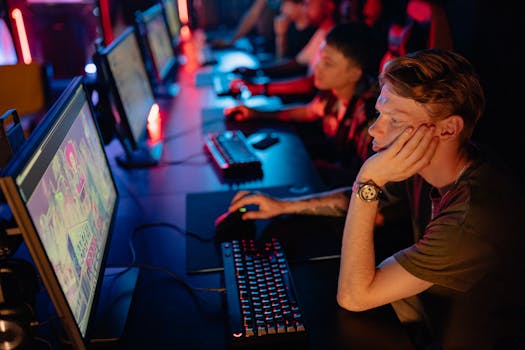Ever been frustrated because you and your co-op partner couldn’t get on the same page? You’re not alone. Cooperative gaming is fun, yet it quickly becomes challenging if common mistakes go unchecked.
Whether you’re teaming up for a campaign or just tackling a few rounds together, overlooked missteps can grind progress to a halt. Knowing which pitfalls to avoid makes the journey smoother and more rewarding for everyone involved.
Stick around as we dig into what goes wrong in co-op play, why it happens, and how to change course. This guide explores insights to help you become a better partner in any multiplayer adventure.
Communication Makes or Breaks the Experience
Clear communication stands at the heart of every successful co-op playthrough. If you’re not syncing up, misunderstandings can spiral, leading to missed objectives and frustrated teammates who feel left out of decisions.
Think of co-op communication like directions while driving with a friend. One person can’t see traffic signs from the back seat, so sharing what you see creates a smoother trip for both of you.
- Let partners know your intentions before taking action to reduce confusion about team plans.
- Share resources, tips, and findings in real time, rather than keeping info to yourself.
- Check in with teammates often, especially during tense moments or quick events in the game.
- Avoid dominating the discussion; invite feedback and listen to others’ strategies.
- Use both voice and text chat when possible to ensure everyone is heard and informed.
- Clarify unfamiliar terms or mechanics for less experienced players to keep everyone up to speed.
Teams that communicate clearly typically complete missions faster and enjoy more meaningful victories. Strong interaction fosters cohesiveness, lessens disputes, and makes even setbacks fun learning moments.
Respecting Different Play Styles on the Team
Imagine Sarah wants to stealth her way through a mission, but Mike rushes in headfirst. Arguments arise, and neither approach works. This clashing of play styles can create tension if not handled with care.
Consider another scenario: A duo is playing an exploration-heavy game. One prefers to investigate every corner for secrets, while the other chases the main questline. Despite disagreements, syncing efforts can yield unique discoveries or faster completion.
Longtime friends Ben and Chris have different skill levels in a puzzle game. Chris breezes through, eager to solve quickly, while Ben needs more time. If Chris pushes, Ben gets stressed, and the fun evaporates.
Finding a balance between approaches helps everyone enjoy the game. Openly discuss preferred strategies before setting out. By agreeing to alternate or mix techniques, teams maximize both enjoyment and results.
Efficient Sharing of Roles and Responsibilities
Dividing up roles can seem easy, but hasty decisions often leave crucial tasks undone. Thoughtful planning ensures every job fits someone’s strengths, and no detail gets overlooked in the heat of play.
- First, identify each player’s strengths and weaknesses before assigning tasks; this reduces frustration and matches roles to skills.
- Clarify who manages resources, such as health packs or special items—avoid duplication or neglect by ensuring responsibilities are clear from the start.
- Designate a point person for objectives or missions; this keeps the team moving forward with minimal confusion about next steps.
- Rotate roles between rounds, allowing everyone to try different play styles and prevent monotony or resentment from repetitive tasks.
- Set expectations for communication, especially if one player has a leadership role, so no one feels silenced or overruled.
- If disagreements arise, pause and revisit assignments together rather than letting frustration build or ignoring the root problem.
- Keep flexibility in mind—sometimes, mid-game surprises will require players to adapt quickly and swap roles on the fly.
A structured approach to sharing responsibilities turns chaos into cooperation. The game becomes more rewarding when every player feels their efforts matter and everyone stays engaged.
Managing Resources and Inventory Collaboratively
In co-op play, resource management is a team sport, not a solo quest. If only one player grabs all the loot, others will struggle, and the team likely falters at crunch moments.
Picture two approaches: One where everyone hoards what they find, and another where items get shared according to need. The first approach often means the group hits a wall during tough battles. The second lets the team support each other and adapt to challenges.
| Approach | Resource Sharing | Result |
|---|---|---|
| Hoarding | Poor | Weak teammates, struggling progress |
| Balanced | Fair | Stable team, smoother challenges |
| Strategic | Based on needs | Optimized for efficiency and teamwork |
By comparing these scenarios, it’s clear that fairness and strategic distribution lead to better teamwork. Referencing the table reminds us that resource management often separates winning teams from those that fall short.
Learning to Adapt Strategies Together
Flexibility is crucial in cooperative games. What works for one puzzle or battle may backfire in the next, requiring everyone to adjust tactics and experiment until a solution emerges.
It’s a bit like cooking with friends: Sticking strictly to a recipe might ruin dinner if you run out of ingredients. Adapting as you go means the whole group can enjoy the meal, even if it’s not what you first envisioned.
When facing an unexpected boss fight, brainstorm different approaches together instead of insisting on one method. Maybe a new weapon or skill, suggested by your partner, saves the day—if you’re open to it.
On the flip side, rigid thinking leads to repeated mistakes and wasted time. Teams willing to change plans not only win more often but often discover more enjoyable ways to play together.
Establishing Team Etiquette and Boundaries
- Decide beforehand on interrupting or talking over each other during high-stress moments.
- Agree to pause and revisit strategies if frustration begins to rise among teammates.
- Set guidelines for sharing loot, experience, or in-game perks so everyone feels equally valued.
- Take regular breaks to keep conversations positive and energy levels high for all players.
- Create signals for when someone wants to try a new tactic or needs extra time to plan.
- Encourage a “no blame” rule to focus on solutions, not pointing fingers after mistakes.
Establishing basic etiquette helps maintain respect and prevents little issues from growing into bigger conflicts. Agreeing on boundaries at the outset can make co-op sessions feel friendlier and more productive for everyone.
Players who understand and appreciate each other’s boundaries return to the game with renewed enthusiasm. It’s not just about keeping tempers in check; it’s about building trust in and out of the game.
Handling Failure and Frustration Constructively
When a team wipes out at the last boss, frustration bubbles up. You might wonder what could’ve gone differently, or feel tension rising among friends. It’s easy for blame to take over if you’re not careful.
Now imagine pausing to reflect and share ideas for improvement. Comparing failed attempts to successful runs can show where small changes make the biggest impact. Everyone gets a second wind when the team commits to learning as a unit.
Consider what happens if the group starts pointing fingers instead. Tempers flare and participation drops as players lose motivation. Some might even abandon the game altogether when the pressure outweighs the fun.
Moving Forward as a Cohesive Co-op Team
Recognizing recurring mistakes and actively working to resolve them transforms co-op play from stressful to enjoyable. Compare teams that check in with each other to those that don’t—collaborative groups report more victories and higher satisfaction overall.
Wonder how things would change if your team reviewed and improved every time a session ends? Practicing small adjustments can build habits that yield big results, both in the current game and future multiplayer sessions.
Imagine a world where minor mistakes don’t snowball into major arguments. Teams that communicate, share resources, and adapt together often find themselves celebrating achievements others barely dream of.
Wrapping Up Your Co-op Journey with Confidence
Throughout every co-op adventure, success depends on each player’s ability to recognize and avoid common mistakes. Learning from every misstep brings teammates closer and fuels stronger performances in the future.
From clear communication to flexible strategies, the guidelines highlighted in this guide can transform even the roughest teams into smooth, efficient units. It’s the little habits that often make the greatest difference in co-op play.
When players treat setbacks as lessons and establish supportive routines, they turn game nights into lasting memories. Co-op isn’t just about completing objectives—it’s about building teamwork and enjoying the journey together.
If you’re aiming for more rewarding multiplayer experiences, keep these strategies in mind. With every session, you’ll help your group become the kind of team others envy and praise.
Ultimately, avoiding common co-op mistakes is less about perfection and more about growth. Every new match offers a fresh chance to work together better and have a blast along the way.

